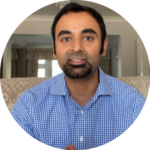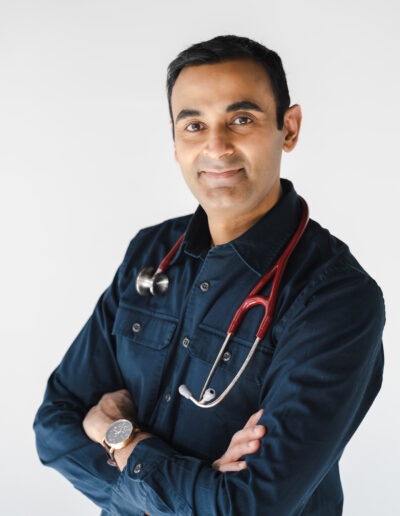“A large study published in the American Journal of Preventive Medicine found that replacing only 30 minutes of sitting every day with moderate or vigorous physical activity was associated with a 45 percent decreased risk of death. If a drug or treatment ever came out showing even a fraction of that effect, it would make billions of dollars. In addition to all the miraculous new treatments we have nowadays, it should also be the job of every physician to strongly promote healthy Lifestyle Medicine for all their patients”
This above statistic could apply to multiple facets of Lifestyle Medicine, including eating more vegetables and fruits, socializing, and de-stressing. I am a Doctor of Medicine and truly believe in the power of modern-day medicines. Drugs like antibiotics and clot-busters are miraculous—as are many of the other therapeutics we get to prescribe on a daily basis. Medicines our historical ancestors could only dream of. But alas, unfortunately the pendulum has swung too far the other way as of 2021, as the minds of modern doctors are trained to jump right to the most complex and often, expensive, treatments for our patients. My first book, High Percentage Wellness Steps, was all about this topic, and how a multitude of simple natural everyday steps, yield vastly higher percentage health improvements in studies, when compared with lots of modern-day medicines.
I am not living in cloud cuckoo-land here. I know that many people lack motivation (and resources) and aren’t suddenly going to start eating a healthier diet, exercising, and losing weight. But I also know that the medical community doesn’t try anywhere near as hard as it could—to reinforce the healthy living message! The 2020 COVID response is a classic example. We know that for younger patients in particular (those under 60) one of the biggest risk factors for getting sick is obesity. I have witnessed this myself at the frontlines in the hospital. America, with its soaring waistline and BMI over the last few decades, has suffered terribly at the hands of COVID, compared with many other countries (including Japan, South Korea, and many European nations) because of this fact. What a perfect opportunity for us to act. Yet how did the medical community respond? Almost radio silence from most doctors and all medical organizations. Quite shameful and a huge missed opportunity to gently and sensitively reinforce this message next to every story on isolating and wearing masks (boosting your own immune system by healthy living).
Medical school and postgraduate training needs to up their game too. Doctors must be educated better. Patients of the future need a Lifestyle Medicine prescription, from their doctor, along with all of their medicines, written on a pad:
“Go walk briskly outdoors in nature for 30 minutes every day”
“Spend time socializing or watching your favorite comedy to help you relax”
“Listen to your favorite music with your eyes closed for 30 minutes daily”
“No iPhone or computer for 2 hours before bedtime for better, more restful sleep”
“Switch your emails off when you get home to spend quality time with your family”
“Walk 10 times a day in the hospital corridor during your stay to get better faster from your illness”
“Cut your social media use by at least 50 percent to feel happier and more energetic”
…..it’s there for the taking to improve our patients’ health and wellness—low hanging fruit—and doctors shouldn’t underestimate the power of the advice that comes out of their mouths.
 Suneel Dhand is a physician, writer, and YouTuber. He is Founder at MedStoic Lifestyle Medicine and DocsDox . Follow him on YouTube and Instagram
Suneel Dhand is a physician, writer, and YouTuber. He is Founder at MedStoic Lifestyle Medicine and DocsDox . Follow him on YouTube and Instagram


I’m back Suneel, this time to address the role of patients in this whole problem.
Having taught health to college students was tedious. They didn’t want to know except they had to take the course. While I may not have been the most theatric or inspiring of professors, I did have helpful information for them. BUT, they weren’t interested. But they thought they had heard it all before.
Hence we have a problem of people not caring about their personal health until a problem arises or a pain develops. Further, they haven’t learned how to nurture their own selves but even more devastating, these college students, as future parents, don’t have a clue as to how to take care of their offspring! What a vicious circle of neglect.
How do we break that awful cycle. The family and primary educators have the best podium for doing so but by the time they get to college, it is ‘ho-hum’ despite the enormous effect that it will have on them, their children and the nation.
I don’t believe the exercise/nutrition admonishments are working. Further, processed food manufacturers have an open door to sell their products – at a better price.
This is a national problem that needs national attention!
Enuf said
Hi Sue, I agree motivation is a huge problem! I think one strategy, especially in younger people… may be to tie a healthy lifestyle, more intrinsically to SUCCESS in life e.g.career/goals/relationships… this could work better in convincing people to be healthier! Regards, Suneel
Agreed Suneel.
Exercise has a tremendous part in body and mind healing and maintaining good health.
Sitting has the same effect on the body as smoking has.
A lot should be done to combat sedentarism.
Cheers,
Cornel.